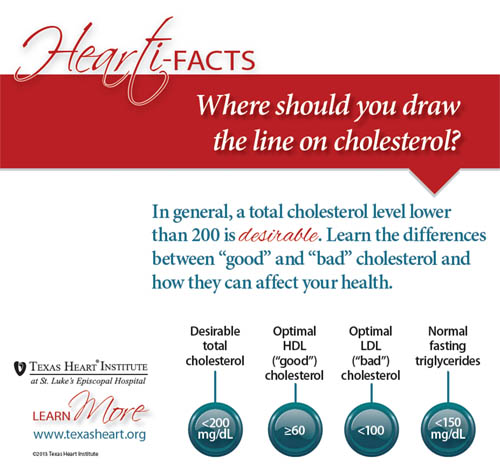
High blood cholesterol is one of the major risk factors for heart disease. Research has shown that by lowering your blood cholesterol, you will greatly reduce your risk of heart disease.
What is cholesterol?
Cholesterol is a fat-like substance called a lipid that is found in all body cells. Your liver makes all of the cholesterol your body needs to form cell membranes and to make certain hormones. Extra cholesterol enters your body when you eat foods that come from animals, like meats, eggs, and dairy products. Although we often blame the cholesterol found in foods that we eat for raising blood cholesterol, the main culprit is actually saturated fat. Foods rich in saturated fat include butter fat in milk products, fat from red meat, and tropical oils such as coconut oil.
Blood cholesterol levels, which tell how much lipid or fat is in the blood, are expressed in milligrams per deciliter (mg/dL). In general, you want to have a cholesterol level below 200 mg/dL. Between 200 mg/dL and 239 mg/dL, your cholesterol level is elevated or borderline-high and should be lowered if you can. With a level of 240 mg/dL or above, your cholesterol level is high, and there is a need for action. For example, changing your diet, beginning an exercise program, and taking statins or other cholesterol-lowering medicines are all ways to lower your cholesterol level.
High-Cholesterol Country
According to the American Heart Association, more than 43% of American adults have cholesterol levels of 200 mg/dL or higher.
The risk of high cholesterol, or hypercholesterolemia, tends to be greater as we age, and the condition affects more women than men. Obesity of any kind, lack of physical activity, and diabetes are other important risk factors.
The Good, the Bad, and the Total
Cholesterol travels to cells through the bloodstream in special carriers called lipoproteins. Two of the most important lipoproteins are low-density lipoprotein (LDL) and high-density lipoprotein (HDL). Doctors look at how LDL, HDL, and fats called triglycerides relate to each other and to your total cholesterol level.
Low-density Lipoprotein
LDL particles deliver cholesterol to your cells. LDL cholesterol is often called "bad cholesterol" because high levels are thought to lead to heart disease. Too much LDL in the blood causes a fatty buildup (plaque) to form on artery walls, which starts a disease process called atherosclerosis. When plaque builds up in the coronary arteries that supply blood to the heart, you are at greater risk of having a heart attack. Your LDL levels may be high if you eat a diet with a lot of saturated fat, cholesterol, or both. Sometimes, an under-active thyroid (called hypothyroidism) may also increase LDL levels.
High-density Lipoprotein
HDL particles carry cholesterol from your cells back to your liver, where it can be removed from your body. HDL is known as "good cholesterol" because high levels are thought to lower your risk of heart disease. If you have low HDL levels, you have a greater heart disease risk, even if your total cholesterol is below 200 mg/dL. Low HDL is often the result of physical inactivity, obesity, or smoking. It is also common for people who have type 2 diabetes to have low HDL levels. Men generally have lower HDL cholesterol levels than women do, because the female hormone estrogen raises HDL. But when women stop having their monthly menstrual periods, their levels of HDL may decrease.
Triglycerides
Triglycerides are fats that provide energy for your muscles. Like cholesterol, they are delivered to your body's cells by lipoproteins in the blood. If you eat foods with a lot of saturated fat or carbohydrates, you will raise your triglyceride levels. Elevated levels are thought to lead to a greater risk of heart disease, but scientists do not agree that high triglycerides alone are a risk factor for heart disease. People with high triglycerides are often obese or have low levels of HDL cholesterol, high blood pressure, or diabetes, all of which are risk factors for heart disease. Extremely high triglyceride levels (more than 1000 mg/dL) can lead to abdominal pain and a life-threatening disorder of the pancreas called pancreatitis.
Total Cholesterol
A measure of total cholesterol in the blood is found by adding up the cholesterol carried in LDL particles, HDL particles, and other lipoproteins. All adults 20 years or older should have what is called a full lipoprotein profile once every 5 years. You will need to stop eating for 10 to 12 hours before this test, and the only liquid you may drink is water. This full profile will tell your doctors what your total cholesterol, LDL, HDL, and triglyceride levels are. LDL is the most important lipid for predicting your heart disease risk.
If your cholesterol levels were measured from a non-fasting blood sample, meaning you have eaten within 10 to 12 hours of the test, doctors will only be able to calculate your total cholesterol and HDL cholesterol. If the results show that your total cholesterol is high, your HDL cholesterol is low, or if you have other risk factors for heart disease, your doctor will probably order a full lipoprotein profile.
Doctors can then look at the results of your full lipoprotein profile, as well as your other risk factors for heart disease, and use a risk assessment tool to better predict your chances of having a heart attack within 10 years.
See on other sites:
Risk Assessment Tool for Estimating Your 10-year Risk of Having a Heart Attack
http://cvdrisk.nhlbi.nih.gov/calculator.asp
The ratio of total cholesterol to HDL cholesterol also gives more information about your risk of heart disease than your level of total cholesterol alone does. The ratio is obtained by dividing the value of total cholesterol by the value of HDL cholesterol. A number higher than 5 shows an increased risk in people who do not have heart disease. People who already have heart disease should not have a number higher than 4.
|
Cholesterol and Triglyceride Levels (mg/dL)
|
|
Total Cholesterol
|
|
Less than 200
|
Desirable
|
|
200-239
|
Borderline high
|
|
240 and above
|
High
|
|
LDL Cholesterol
|
|
Less than 100
|
Optimal
|
|
100-129
|
Near optimal/above optimal
|
|
130-159
|
Borderline high
|
|
160-189
|
High
|
|
190 and above
|
Very high
|
|
HDL Cholesterol
|
|
Above 40
|
Desirable
|
|
Triglycerides
|
|
Less than 150
|
Normal
|
|
150-199
|
Borderline high
|
|
200-499
|
High
|
|
500 and above
|
Very high
|
|
Source: Adapted from the National Cholesterol Education Program of the National Institutes of Health, Third Report of the Expert Panel on Detection, Evaluation, and Treatment of High Blood Cholesterol in Adults (Adult Treatment Panel III)
|
Cholesterol Testing
It is best to have your cholesterol tested by trained medical personnel. Your blood sample should be sent to an approved laboratory for testing. Tests performed at health fairs, at shopping centers, or using home-testing kits may not always give you laboratory-grade results. If you get an unusual result from any source, you should see your doctor.
You should keep your normal eating habits, exercise pattern, and weight before cholesterol testing, except for the 10 to 12 hours before having the full lipoprotein profile, when you cannot eat or drink anything but water. You may need to have the test on another day if you have a cold or the flu or have recently changed a medicine. Your doctor may also ask you not to drink alcohol for several days before testing, especially for a true reading of triglyceride levels.
Improving Lipid Levels
A diet low in saturated fat and cholesterol is key to lowering LDL cholesterol levels. A diet with between 25% and 35% of total calories from fat (mostly unsaturated fat) and less than 7% of total calories from saturated fat is recommended.
See on other sites:
American Heart Association Healthy Eating
www.heart.org/HEARTORG/HealthyLiving/HealthyEating/Healthy-Eating_UCM_001188_SubHomePage.jsp
Other key lifestyle changes for lowering LDL include increasing your physical activity, watching your weight, and eating foods high in fiber. Foods that contain plant stanols and sterols may also help lower LDL. Plant stanols and sterols can be found in special margarines at your grocery store. In some cases, patients find it helpful to see a dietitian, who can help them set up an eating plan.
The key lifestyle changes for increasing low HDL cholesterol are losing weight (if you are overweight), quitting smoking, and increasing physical activity.
Patients with elevated triglyceride levels should control body weight, limit how much alcohol they drink, eat a diet low in saturated fat, and decrease the amount of simple carbohydrates (or sugar) that they eat. The liver changes extra calories from carbohydrates into triglycerides.
A number of medicines are very effective and safe for lowering LDL cholesterol levels. Cholesterol-lowering medicines called statins have been shown to reduce the risk of heart attack and stroke and the need for coronary artery bypass surgery or angioplasty. It is very important that you continue with lifestyle changes even if your doctor gives you cholesterol-lowering medicine. Although cholesterol-lowering medicine can lower your total cholesterol, it does not protect against other risk factors for heart disease, such as obesity and physical inactivity.
Experts from the National Cholesterol Education Program (NCEP) say that more aggressive cholesterol treatment is needed for people at high risk of dying from a heart attack or cardiovascular disease. The basic message of the group's recommendations is the lower the better when it comes to levels of low-density lipoprotein (LDL) or "bad cholesterol." The updated recommendations say that almost all high-risk patients with LDL cholesterol levels of 100 mg/dL or higher should begin taking cholesterol-lowering medicine.
Reducing your cholesterol level does not give you complete protection from heart disease, but doctors agree that it is one of the most important ways to reduce your risk.
See also on this site: Statins, Cholesterol-Lowering Medicines

See on other sites:
MedlinePlus
https://medlineplus.gov/cholesterol.html
Cholesterol
National Heart, Lung, and Blood Institute resource site
www.nhlbi.nih.gov/health/health-topics/topics/hbc/
What is Cholesterol? What is High Blood Cholesterol?
American Heart Association
www.heart.org/HEARTORG/Conditions/Cholesterol/
CholestrolATH_UCM_001089_SubHomePage.jsp
Cholesterol
Updated August 2016



